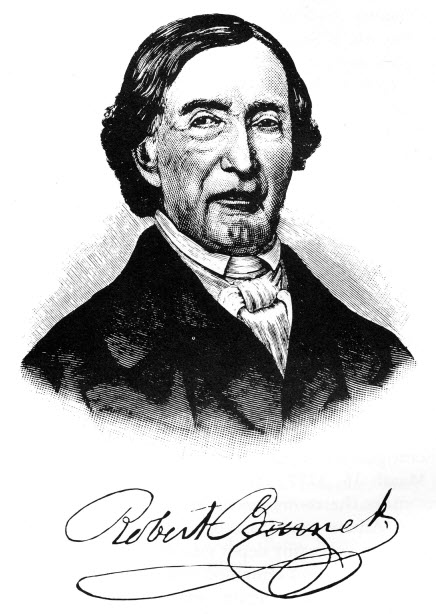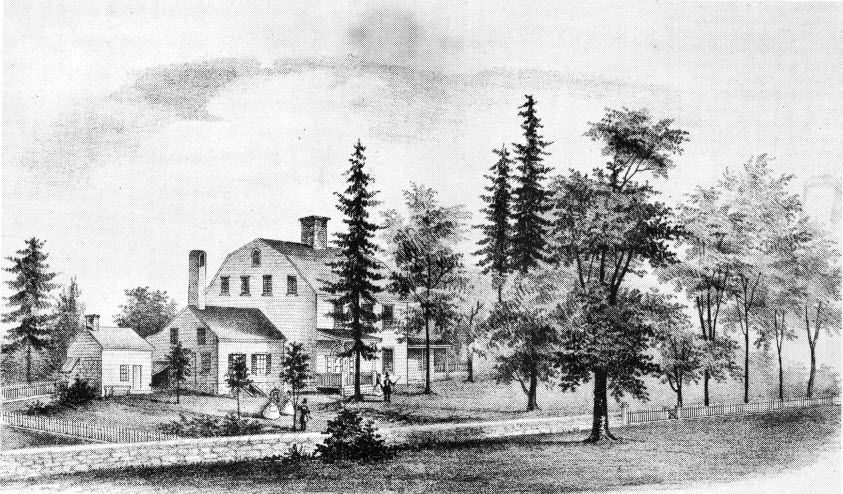Robert R. Burnet (1762-1854)- The Last Continental Officer
Alan C. Aimone and Barbara A. Aimone
[Editor's Note: This article appeared in the 1977 Issue of the Journal of the Orange County Historical Society. It is being republished on the website as part of the ongoing activities surrounding the 250th Anniversary of the Revolutionary War. The footnoted version is contained in the 1977 Journal which is available for purchase. JAC]
====================
The last surviving Revolutionary War officer was a prominent Orange County resident. Robert Reid Burnet was a grandson of Robert Burnet, a Scotch tailor who had emigrated from the Edinburgh area to Raritan, New Jersey, in 1725. On September 25, 1729, Grandfather Burnet purchased a 200-acre farm, part of the original Andrew Johnston and John Parker land patent. West of Newburgh, in an area later known as Little Britain, the pioneering Burnet constructed his log cabin.
 Robert Burnet
Robert Burnet
Robert Reid Burnet, born on February 22, 1762, was the third child of James and Mary Nicholson Burnet. He was given his paternal grandfather's first name, Robert, and his paternal grandmother's maiden name, Reid. Young Burnet was a schoolmate of James Clinton's son, Alexander, and both youngsters attended Reverend John Moffat's Academy in Little Britain.
The Revolutionary War created some exciting moments for young Burnet and his friends. The Little Britain boys, aged fourteen to sixteen, formed their own militia company for home protection. After a squabble between Burnet and Alexander, it was resolved that the boys would jointly command the "soldier boys' home guard company."
On March 16, 1777, the young company traveled in three wagons under the command of Major George Nicholson, from Esopus to Albany and Saratoga. These Ulster County boys relieved prison and army depot guards during their short service at these two places and remained under Nicholson's supervision. During the Fall they again served when Daniel Morgan requested that the boys relieve his tired riflemen by guarding German soldiers who had been captured at Saratoga. The militia company successfully performed this duty when the prisoners were quartered across from Burnet's home at William Telford's Tavern. William Telford was a captain in Colonel James McClaughry's Second Ulster (or South End) Regiment. On March 4, 1780, Burnet was commissioned an ensign in the ninth or New Windsor Precinct Company, commanded by Telford.
A year later, on June 29, 1781, Burnet received a second lieutenant's commission from New York Governor George Clinton, who was both a neighbor and a friend to James Burnet. Young Burnet was assigned to Captain William Stevens' 5th Company of the New York Corps of Artillery (also called the 2nd Continental Artillery Regiment) commanded by Colonel John Lamb. Burnet participated in the successful Yorktown siege for which Lamb's Artillery received praise from both Brigadier General Henry Knox and General George Washington. Stevens' company earned additional praise from Knox "for the care and industry in bringing forward the remainder of the Stores." The company was charged with responsibility for transferring the artillery equipment from wagons to boats at Philadelphia, and then reloading the stores into wagons at Elk Landing, Maryland.
Following the Yorktown campaign, Burnet was assigned to assist Captain Andrew Moodie in recruiting men for the 2nd Company of Lamb's Artillery. After recruiting duty during the Spring of 1782, Burnet was placed in command of Redoubt No. 3 at West Point and was responsible for keeping it manned. Redoubt No. 3 was part of a series of small fortifications guarding the strategic Hudson Highlands. Most of the company probably was encamped on the plain at West Point. In the event of British activity in the area, Burnet and his company were to be signalled by a 4-pounder gun from headquarters at Moore's House. They were then responsible for alerting the West Point garrison by firing three 18-pounder cannons at intervals of thirty seconds. After duty at West Point, Burnet and his company were encamped during the Winter of 1782-1783 at the New Windsor Cantonment.
During his stay at New Windsor, Burnet participated in three important events. He may have supported Colonel Nicola's "crown letter", which proposed making Washington king. Washington quickly rejected the suggestion for an American monarchy.
Burnet was delegated on March 15, 1783, to attend a meeting of officers held at the "Temple" to hear Washington answer the anonymous "Newburgh Letters." Washington, in a dramatic speech, put an end to the "Newburgh Conspiracy".
Burnet was also present at the founding of the Society of the Cincinnati. He was to become the last surviving original member of that organization.
On June 17, 1783, after the New York Corps of Artillery was disbanded, Burnet transferred to Major Sebastian Bauman's Corps of Artillery stationed at West Point. He was reassigned command of Redoubt No. 3 until November 3, 1783, when he was released from duty.
Chroniclers have described Burnet as tall and erect, with a kindly face and unquestionable integrity. He married Rachael DeWitt on June 9, 1784, in the New Windsor Presbyterian Church. Rachael, a "rotund, rosy-cheeked dame who spoke English with a Dutch accent and idiom", was considered an "excellent woman." She was Governor DeWitt Clinton's cousin and Mary Clinton's niece. Mary and her husband, Brigadier General James Clinton later relied upon Burnet to handle their legal affairs, including their wills.
The couple resided in grandfather Burnet's log cabin and cultivated hay and grain on a twenty-five-acre holding. In recognition of his military service as an officer in the Continental Army, on July 7, 1790, two 600-acre patents located in Cato and Virgil Townships (between Lake Seneca and Lake Oneida) were issued to him by the State of New York. He was awarded another 200 acres of military bounty land by the United States Government on October 9, 1790. The sale of the bounty lands to his brother-in-law, Moses DeWitt, probably enabled Burnet to lease, and later purchase, the original 200-acre Burnet farm from his father, James, and uncle, Major John Burnet. Then he built a large four-story gambrel-roofed house on the property, south of present-day New York Route 207. The Burnets must have liked to entertain as the new wooden-pegged and heavy-beamed house included a ballroom.
 Burnet's Home Built in 1804 in Little Britain
Burnet's Home Built in 1804 in Little Britain
A respected citizen, Burnet held several local public offices from 1792 through 1824. For the Town of New Windsor, he was Justice of the Peace and Town Clerk for a number of years. As an Assistant Assessor of the Fifth Assessment District, in the Third Division, in the State of New York, Burnet, in 1798, supervised the valuation of lands and dwelling-houses, and the enumeration of slaves in the Town of New Windsor. From 1800 to 1808, Burnet served as a member of the New York Assembly, and in this capacity sponsored a bill to drain meadows throughout New York, for farm land. Because the bill passed, Beaver Dam and Rice Meadows in New Windsor were drained.
Burnet was well-known in the area for he transacted business with people in Montgomery, Hunting Grove, New Windsor, Minisink, Little Britain, and Goshen. Moses DeWitt held the post of Sheriff of Orange County and often directed business to Burnet. When Burnet's son, Moses DeWitt Burnet, was employed by the Sheriff, he did likewise. Burnet frequently served as executor and administrator of large estates, drew up land deeds, and negotiated other legal agreements.
Burnet's later years were spent in his armchair reminiscing, especially about the war. A favorite companion was Uzal Knapp, a former sergeant in Captain von Herr's Provost Troop of Light Dragoons, which was attached to Washington's Life Guard in September, 1782. Knapp was among the last horsemen in the Continental Army. He often walked to Burnet's home where he sat on the porch as the two men swapped tales of their war experiences. Each year, Burnet and Knapp rode in a carriage in the Newburgh Independence Day parade and were honored as veterans of the Revolutionary War.
Robert Burnet never moved from his home in Little Britain where he died on November 24, 1854, in his 93rd year. He was buried at noon on a "bleak and cold" Saturday in the cemetery of the Associate Reformed Church (Presbyterian) of Little Britain. His passing marked the death of the man who was not only the last living officer of the American Revolution but had held also the distinction of being the last surviving original member of the Society of the Cincinnati.
Next Issue of Journal!
The Next Issue of the OCHS Journal is now accepting articles for consideration.
Authors
More guidelines for authors
Classics from the Journal
NEW!! The New Windsor Artillery Park, 1780-1781 - Part I
by Michael S. McGurty
NEW!! The New Windsor Artillery Park, 1780-1781 - Part II
by Michael S. McGurty
NEW!! Orange County Militia During the American Revolutionary War
by Alan Aimone
George Washington's Masonic Activities in Orange County
by Andrew J. Zarutskie
Prisoners of War in Goshen
by Harold J. Jonas
John Robinson of Newburgh
by Margaret V. S. Wallace
The Battle of Fort Montgomery
by Donald F. Clark
Role of Regional Revolutionary Women
by Michelle P. Figliomeni
Robert R. Burnet (1762-1854)- The Last Continental Officer
by Alan C. Aimone and Barbara A. Aimone
The Revolutionary Soldier in Washington's Army
by Edward C. Cass
Technical Communication in the Amercan Revolution
by Carol Siri Johnson
New Windsor Cantonment
by E. Jane Townsend
Sidman's Bridge
by Kenneth R. Rose
Corridor Through the Mountains
by Richard Koke
Lydia Sayer Hasbrouck and "The Sybil"
by Amy Kesselman
The Store at Coldengham (1767-1768)
by Jay A. Campbell

